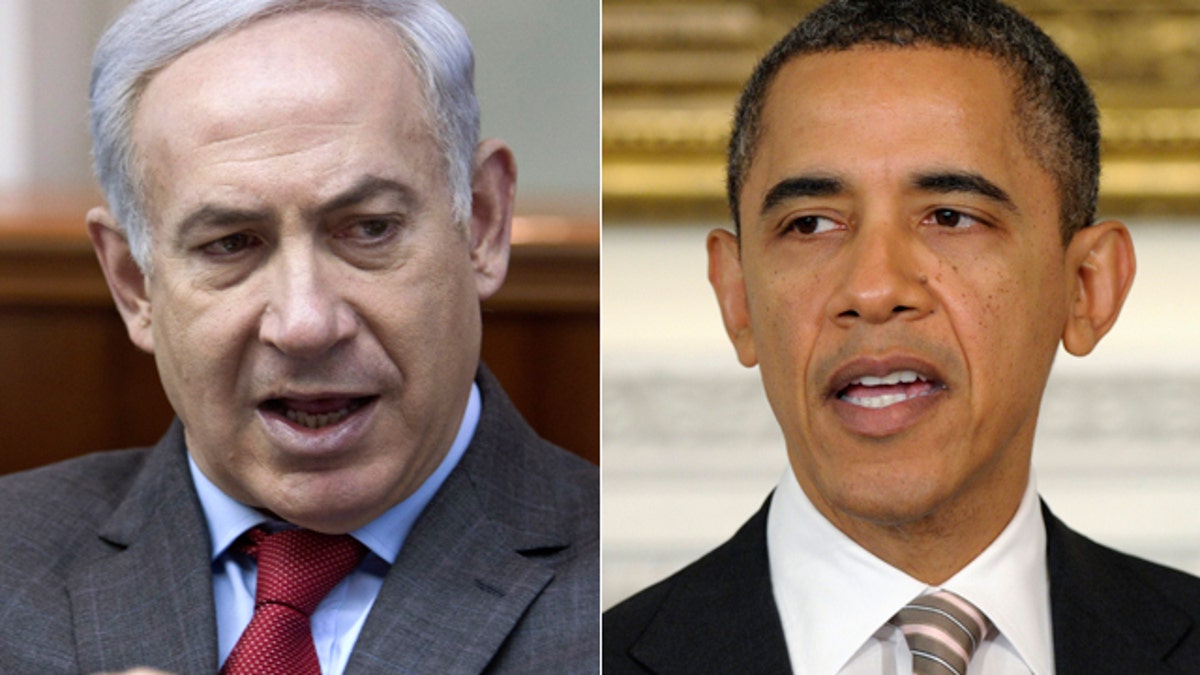
Israeli Prime Minister Benjamin Netanyahu is preparing for high-stakes meetings in Washington with President Obama on the Iranian nuclear threat. (AP)
JERUSALEM – Israel's prime minister sets off this week on a U.S. visit clouded by a deepening rift with Washington, which is pressing Israel to hold off on any attack against Iran's suspect nuclear program.
Although Israel says it hasn't decided whether to strike, it has signaled readiness to do so -- a move that would have deep worldwide implications.
Senior Israeli officials say Israel would have to act by summer in order to be effective. U.S. officials, wary that an Israeli strike could drive up oil prices and entangle the U.S. in a new Mideast military confrontation during the presidential election season, want to give diplomacy and sanctions more time to work.
These differences have created tension ahead of Benjamin Netanyahu's arrival at the White House next Monday. Aides to the Israeli leader would not say what he plans to tell President Obama.
"The meeting will be a good opportunity to clarify both sides' stands on ... how to act against the Iranian nuclear threat, which both sides agree is grave," Vice Premier Moshe Yaalon told Israel Radio.
Israel's Haaretz and Israel Hayom newspapers reported Wednesday that Netanyahu wants Obama to deliver an explicit military threat to Iran in a joint statement to be issued after the meeting.
Differing assessments of urgency underlie the disagreements on Iran.
Israel considers a nuclear-armed Iran to be a threat to the existence of the Jewish state. It cites Iranian leaders' repeated calls for Israel's destruction, support for anti-Israel militant groups and its arsenal of ballistic missiles that are already capable of striking Israel. It also fears a nuclear Iran would touch off an atomic weapons race in a region hostile to Israel's existence.
Israel itself is thought to have a significant arsenal of nuclear weapons, though it does not admit that as a matter of policy.
Israel takes little comfort in the U.S. assessment, reiterated Tuesday by Secretary of State Hillary Clinton, that Tehran has not decided whether to build a nuclear bomb. Iran denies it is making nuclear weapons.
Israeli officials note that the U.N. nuclear agency said recently that Tehran is rapidly moving ahead with a key elements associated with bomb making, and Iran is moving its nuclear operations deeper underground. They believe these developments are strong signs of Iranian intentions.
Experts say work on a bomb could begin within a year, if not earlier, but Israeli officials who favor a strike do not want Iran to reach that point. Defense Minister Ehud Barak recently fueled speculation about an Israeli strike by warning the window of opportunity was closing.
Israeli officials have told the U.S. it will not give any warning of an impending attack -- a development confirmed by a U.S. intelligence official this week.
Gen. Martin Dempsey, chairman of the U.S. Joint Chiefs of Staff, told Congress this week he has not counseled Israel against attacking Iran. Instead, he said, "we've had a conversation with them about time" and added he would "absolutely not" take military force against Iran off the table.
Dempsey, U.S. national security adviser Tom Donilon and director of national intelligence James Clapper have all been sent by Obama recently to pressure Israel to hold off.
The U.S. and Europe have approved tough sanctions on Iran's central bank and its key oil sector that are to go into effect this summer. They believe these measures must be given time to work.
Israel has welcomed the sanctions, but it is skeptical they will persuade Iran to back down. Israeli officials believe that by the time the toughest sanctions go into effect this summer, it may be too late to strike.
U.S. officials and others think an Israeli attack could set back the Iranian program a few years at most.
Defense Secretary Leon Panetta has expressed reservations about the effectiveness of an attack on Iran's heavily fortified nuclear facilities and Dempsey has publicly questioned whether it would be worth risking the cascade of consequences liable to follow.
The Iranian nuclear threat is a world problem and not Israel's alone, said Danny Yatom, a former head of Israel's Mossad spy agency. Even a temporary setback to the nuclear program would be useful, Yatom said, because it would buy the world time to try to knock it out entirely.
Iran has warned it would pummel Israel with missiles if attacked, and it could also recruit its allies, Hezbollah in Lebanon and Hamas in the Gaza Strip, to attack Israel with rockets and missiles from closer range.
Tehran could also block the Strait of Hormuz, a key transit route for the world's oil tankers, or strike Gulf targets such as Bahrain, home to the U.S. Navy's 5th Fleet. Either move could send global oil prices skyrocketing and draw the U.S. military into the conflict.
The disagreements over Iran have stoked the tensions that have characterized relations between the Obama and Netanyahu governments, primarily over frozen Israeli-Palestinian peacemaking, which pointedly seems to be a non-issue in the upcoming visit.




